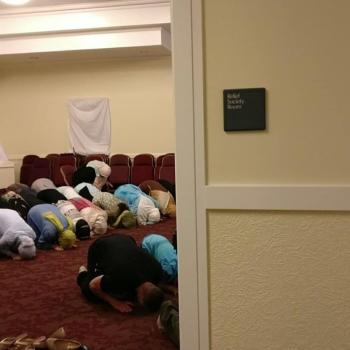
Quite unrelated to the image above:
Fairly commonly, I’m told by critics of Islam that Muslims believe it legitimate to lie to non-Muslims (presumably on just about anything). Thus, supposedly, there’s no value in entering into any contract with Muslims or into any treaty with an Islamic state. Moreover, according to some, you can never trust Muslims anywhere, ever. They may seem to be friendly with you, but they’re just biding their time. Very commonly, in fact they’re bent on killing you and imposing shari‘a on you. And the fact that there’s typically not even a shred of evidence to support that claim merely shows how very adept they are at concealing their attentions. When I point out that I have dozens of Muslim friends and regularly spend considerable time in Muslim-majority areas without hurt or fear, I’m pitied as naïve. Accordingly, Muslim immigration should be stopped. Period.
I expect that what lies behind this claim — which I reject — is the very real notion of taqiyya. Here’s a preliminary stab at explaining taqiyya for The Forthcoming Book:
The Arabic word taqiyya is etymologically linked to the concepts of devotion and “piety” (Arabic taqwa), but it is often translated as “dissimulation.” In Shi’ite thought, the term taqiyya has come to refer to a tactic used by Shi‘ite imams when faced with oppression from the Sunni majority. (Note that it is an idea associated with the relatively small Shi‘ite minority within the Islamic community, and not with Muslims as a whole.)
Under persecution and pressure, Shi‘ite thinkers and leaders came to regard it as advisable and allowable to hide their beliefs when faced with potentially lethal oppression. Significant justification was found for this in the Quranic verse 16:106, where God’s wrath awaits the apostates — “except those who are compelled while their hearts are firm in the faith.” Such people are those who have been forced to practice taqiyya.
Although a Muslim is expected to declare his or her belief publicly, and although to deny it is ordinarily a grievous sin (a kabira, perhaps literally an “enormity”), it was supposedly the common practice of at least some of the principal imams to conform outwardly to Sunni belief while remaining inwardly Shi‘ite. While some imams encouraged self-sacrifice” when their community was vulnerable to oppression, others practiced taqiyya as a balance to shahada (a willingness to expose one’s beliefs in the face of danger).
There is no single clear and orthodox position on when or when not to practice taqiyya in Shi‘ite law, despite numerous debates among Shi‘ite jurists and theologians. However, some factors to be assessed include the risk to oneself and to one’s family and other believers, as well the level of malice involved. That last point is crucial: Taqiyya is about protecting a persecuted minority community, not about cheating on contracts, lying in order to gain profit, or deceiving other parties to a treaty.
One might compare it without too much distortion, I think, to lying to agents of the Gestapo when they ask whether you’re hiding a Jewish family in your attic, which (it turns out) you are. Although I recall one vehement dissenter on this matter, I believe that most of us would say that lying is justifiable under such circumstances and, indeed, is the morally preferable course.












